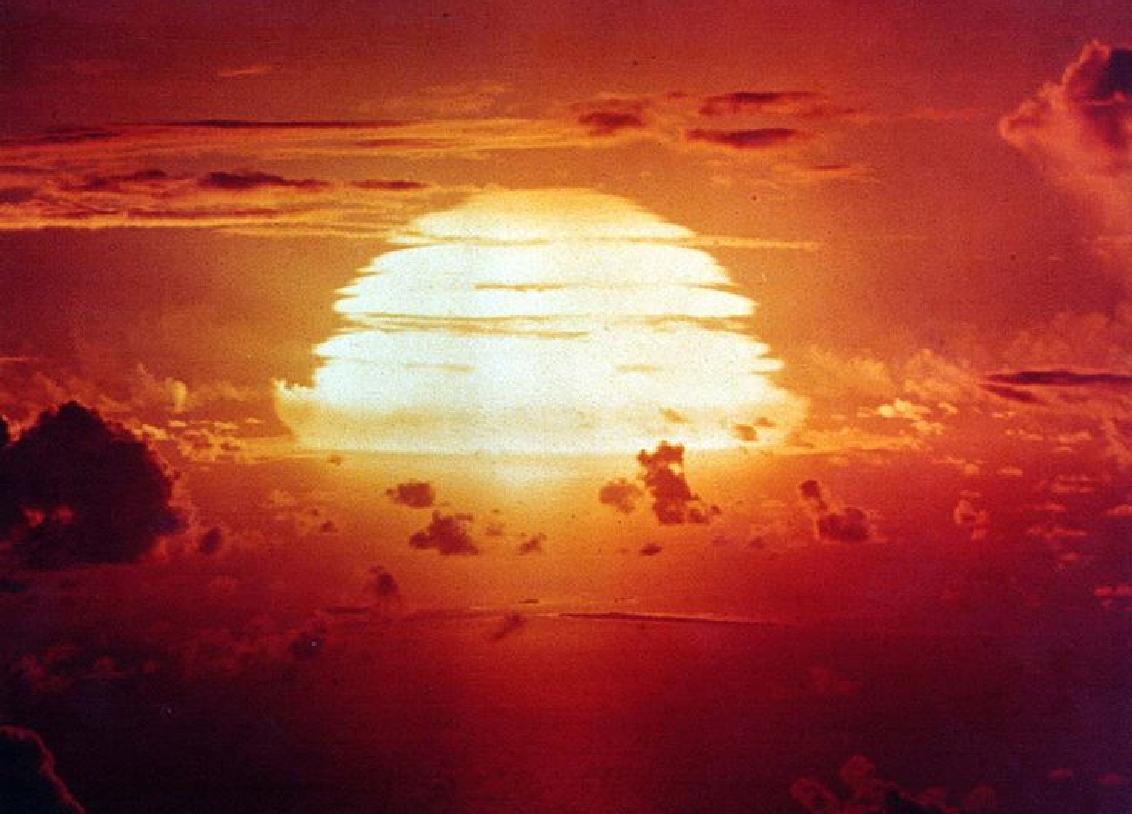Although the United Nations Security Council has only designated five permanent members as "legal holders of nuclear weapons" and signed the Treaty on the Non-Proliferation of Nuclear Weapons, nine countries in the world are currently considered to possess nuclear weapons, and NATO has acquired shared nuclear weapons from the United States. In the 21st century, we seem to be living on the powder keg of nuclear weapons, so will our human civilization be destroyed?

(Photo of the moment of the explosion of the nuclear weapon, the mushroom cloud is like a beautiful blooming "flower of extinction")
But in fact, because of the existence of a balance of so-called "mutually assured destruction", the possibility of human destruction in nuclear war has dropped sharply, falling below the safety line, and this policy is actually a "Nash equilibrium", because all parties are trying to avoid the worst outcome - human extinction.
Internationally, this kind of military strategic thinking of "ending up together" is called "balance of terror", which generally refers to the situation in which both sides are destroyed as long as one side uses nuclear weapons in an all-round way to attack the other side, because the other side implements the policy of "mutual guarantee of destruction", which causes both sides to be destroyed. On the surface, it seems that human civilization is likely to be destroyed by nuclear war, but in fact, invisibly, the "nuclear winter" is farther away from us.
(The U.S. "Guardian of Peace" land-based intercontinental ballistic missile, once a multi-objective re-entry vehicle missile, can carry 10 W87 nuclear warheads per round)
During the Cold War, the use of nuclear weapons as an important military strategy received increasing attention, and weaker states could rely on nuclear weapons to prevent oppression by another, more powerful state. But the problem is that if the country directly loses the nuclear counterattack capability in the first wave of attacks launched by the other side, then having nuclear weapons is also a waste, so the second nuclear counterattack has become an important capability that all countries need to master, especially weak countries.
(Missile-guided nuclear warheads)
Once a nuclear war occurs, countries tear their faces, nuclear bombs are launched, then deterrence loses its effect, and human beings also violate their original intentions, so as early as 1959, the United States has proposed a mature nuclear deterrent theory: a reliable nuclear deterrent force must always be in a state of activation, but it must not be used.
(Nuclear war is not far away from us and can happen at any time, pictured is Hiroshima, Japan, which was "nuclearly leveled" by the US military in 1945))
In this case, the theory of "mutually assured destruction" has become the last barrier to protect human civilization, which assumes that both opposing sides have the nuclear strike capability to destroy each other and even the world, and both sides know that if they rush to launch a nuclear war, they will also be completely destroyed by the other side's counterattack, and there will be no winner in the end. This is obviously not the result that humanity wants, so in this strategy further hypothesis, neither side dares to launch the first nuclear strike, so the magic scene occurs: the original policy is extremely tough, and the two forces that always have a lip service to "nuclear level" each other are still tense, but nuclear war is almost impossible to come again, and a disguised peace is easily created.
(Spin-off multi-warhead INTERCONTINENTAL missiles capable of launching intensive nuclear strikes against enemy targets to ensure destruction)
Of course, the principle of "mutually assured destruction" requires that there cannot be only one nuclear State in the world, and that there cannot be too much difference in each other's nuclear strike capabilities, otherwise the conditions for mutual checks and balances cannot be created at all. Suppose, then, that if the Soviet Union had not followed the United States in developing nuclear weapons after the end of World War II, it is very likely that the United States would have used nuclear weapons recklessly to suppress its opponents.
The core of the "mutually assured destruction" theory, or the fundamental reason for maintaining world peace, is the credibility of the threat, that is, the ability to be convinced of the smooth implementation of nuclear strikes (counterattacks), at this time both sides need to work on the nuclear weapons projection system, even if it is not used, it will be crazy to throw money into it. The most absurd and interesting point is that because of the need to ensure mutual destruction, the means of defending each other's nuclear weapons cannot be too strong (for example, the missile defense system of one side is strong enough to ensure the interception of all incoming nuclear missiles), that is, the other side cannot be made to think that it is impossible to "nuclearly level" its own enemy, otherwise the principle of "mutual guarantee of destruction" will immediately fail.
(U.S. anti-ballistic missile intercept test)
Thus, in this case, the two sides, for fear of provoking each other, would unanimously stop the development or deployment of nuclear weapons and sign the corresponding treaty restricting anti-ballistic missiles, in which the United States and the Soviet Union signed the Anti-Ballistic Missile Treaty in 1972. But the United States withdrew from the treaty in 2001, and the Infrof Treaty, which the Trump administration formally withdrew from last year, is, to the extent more serious, this kind of behavior is promoting nuclear war.